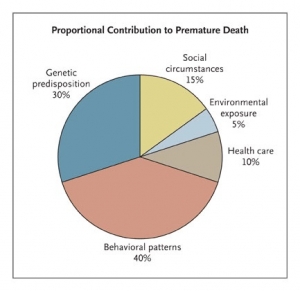Financial Incentives to Creating Health from the Federal Reserve
June 7, 2016
 A panel presentation at the 2016 Integrative Healthcare Symposium explored ways communities are responding to the startling reality that medical services are a minor factor regarding the health of populations. More important factors include genetics, poverty, education, environment, and other so-called determinants of health. A movement is afoot among many stakeholders on how to address these challenges. Now, in an initiative sponsored by the integrative health-oriented Samueli Institute, a leader of the Federal Reserve of San Francisco describes the kinds of financial incentives that are emerging to leverage this new focus on creating health.
A panel presentation at the 2016 Integrative Healthcare Symposium explored ways communities are responding to the startling reality that medical services are a minor factor regarding the health of populations. More important factors include genetics, poverty, education, environment, and other so-called determinants of health. A movement is afoot among many stakeholders on how to address these challenges. Now, in an initiative sponsored by the integrative health-oriented Samueli Institute, a leader of the Federal Reserve of San Francisco describes the kinds of financial incentives that are emerging to leverage this new focus on creating health.  The data point that anchors this growing movement is from the Institute of Medicine’s Mike McGinnis, MD. In 2002, McGinnis’ team concluded that medical services represent 10%, a minor fraction, of the influences on – the reverse of health - “premature death.” Other analyses are more generous toward medical services, with as much as 20% represented. Still, 95% of our social investment in health is directed at medical services. How can a more appropriate investment be leveraged – especially given the power of the $3-trillion medical industry? The Samueli Institute initiative is seeking to answer this question. One goal is to create a game-plan that might guide the new US president and the 2017 Congress toward this massive re-orientation. The Institute, led by the 2015 Integrative Healthcare Symposium Leadership Award winner Wayne Jonas, MD, calls its work WIN III – the Wellbeing Initiative for the Nation III.
The data point that anchors this growing movement is from the Institute of Medicine’s Mike McGinnis, MD. In 2002, McGinnis’ team concluded that medical services represent 10%, a minor fraction, of the influences on – the reverse of health - “premature death.” Other analyses are more generous toward medical services, with as much as 20% represented. Still, 95% of our social investment in health is directed at medical services. How can a more appropriate investment be leveraged – especially given the power of the $3-trillion medical industry? The Samueli Institute initiative is seeking to answer this question. One goal is to create a game-plan that might guide the new US president and the 2017 Congress toward this massive re-orientation. The Institute, led by the 2015 Integrative Healthcare Symposium Leadership Award winner Wayne Jonas, MD, calls its work WIN III – the Wellbeing Initiative for the Nation III.  Jonas (pictured left) is familiar with this terrain. In 2008, he worked with the Integrative Health Policy Consortium and others to promote what some call “health in all policies.” That is, policy leaders in transportation, energy, defense, budget, and other agencies would be asked to think about the health impacts of their decisions. The initiative had significant impact. Via the Affordable Care Act, the National Prevention, Health Promotion and Public Health Council was established and now routinely brings nearly 20 agency heads together to explore the health dimensions of their work. By statute, an Advisory Group on Prevention, Health Promotion, and Integrative and Public Health includes members from the integrative health community such as Janet Kahn, PhD; Charlotte Kerr, LAc, MPH; and Dean Ornish, MD.
Jonas (pictured left) is familiar with this terrain. In 2008, he worked with the Integrative Health Policy Consortium and others to promote what some call “health in all policies.” That is, policy leaders in transportation, energy, defense, budget, and other agencies would be asked to think about the health impacts of their decisions. The initiative had significant impact. Via the Affordable Care Act, the National Prevention, Health Promotion and Public Health Council was established and now routinely brings nearly 20 agency heads together to explore the health dimensions of their work. By statute, an Advisory Group on Prevention, Health Promotion, and Integrative and Public Health includes members from the integrative health community such as Janet Kahn, PhD; Charlotte Kerr, LAc, MPH; and Dean Ornish, MD.  For WIN III, Jonas invited an unusual guest into a leadership role: Ian Galloway (pictured right), a senior analyst at the Federal Reserve Bank of San Francisco. In a publicly available webinar on “Models to Finance Health and Well-Being,” Galloway led listeners through four emergent financial strategies. These are:
For WIN III, Jonas invited an unusual guest into a leadership role: Ian Galloway (pictured right), a senior analyst at the Federal Reserve Bank of San Francisco. In a publicly available webinar on “Models to Finance Health and Well-Being,” Galloway led listeners through four emergent financial strategies. These are: - Investment Tax Credits - Gallagher explains how this might be used to promote investment in the environment, re-training in education, and other areas associated with the determinants.
- Prize-Based Philanthropic Awards - Gallagher believes that large awards could drive significant health-creating activity. The programs are outcomes based and payment only comes with success.
- Points for Performance - This is a smaller program that would urge social investors and banks that need to meet Community Reinvestment Act requirements, and philanthropically-oriented lenders, to offer loans at lower rates (“points”) based on evidence of the beneficiaries producing positive community health outcomes.
- Pay for Success - This thinking turns typical granting on its head. Rather than being paid for a plan to do something, the entity is paid for outcomes and performance.




















SHARE